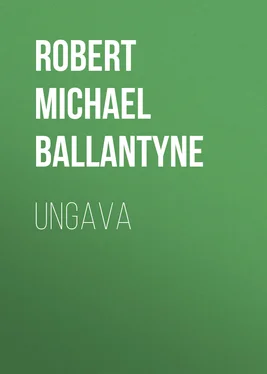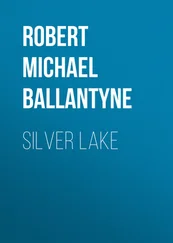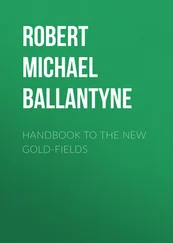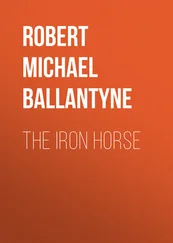Robert Michael Ballantyne - Ungava
Здесь есть возможность читать онлайн «Robert Michael Ballantyne - Ungava» — ознакомительный отрывок электронной книги совершенно бесплатно, а после прочтения отрывка купить полную версию. В некоторых случаях можно слушать аудио, скачать через торрент в формате fb2 и присутствует краткое содержание. Жанр: Детские приключения, literature_19, foreign_antique, foreign_prose, foreign_children, на английском языке. Описание произведения, (предисловие) а так же отзывы посетителей доступны на портале библиотеки ЛибКат.
- Название:Ungava
- Автор:
- Жанр:
- Год:неизвестен
- ISBN:нет данных
- Рейтинг книги:3 / 5. Голосов: 1
-
Избранное:Добавить в избранное
- Отзывы:
-
Ваша оценка:
- 60
- 1
- 2
- 3
- 4
- 5
Ungava: краткое содержание, описание и аннотация
Предлагаем к чтению аннотацию, описание, краткое содержание или предисловие (зависит от того, что написал сам автор книги «Ungava»). Если вы не нашли необходимую информацию о книге — напишите в комментариях, мы постараемся отыскать её.
Ungava — читать онлайн ознакомительный отрывок
Ниже представлен текст книги, разбитый по страницам. Система сохранения места последней прочитанной страницы, позволяет с удобством читать онлайн бесплатно книгу «Ungava», без необходимости каждый раз заново искать на чём Вы остановились. Поставьте закладку, и сможете в любой момент перейти на страницу, на которой закончили чтение.
Интервал:
Закладка:
Mr Stanley, Dick Prince, and Massan, as was their wont, held a council upon the existing state of things, and after much gazing round at the sea and up at the sky, and considerable grunting of his deep voice and rubbing of his capacious chin, on the part of the latter, he turned to Dick Prince, as if appealing to his superior sagacity, and said—
“Well, ye see, my ’pinion’s jist this: yonder’s the mainland there” (pointing to the eastward, where, about ten miles distant, the rocks and trees were seen distorted and faintly looming through a tremulous haze), “an’ there’s our canoes there ” (jerking his thumb over his shoulder in the direction of the large canoes, whose torn sides and damaged ribs, as they lay exposed on the sand, bore sad testimony to the violence of the previous night’s storm), “and there’s the little canoe yonder,” (glancing towards the craft in question, which lay on the beach a hopelessly-destroyed mass of splinters and shreds of bark that projected and bristled in all directions, as in uncontrollable amazement at the suddenness and entirety of its own destruction). “Now, that bein’ the case, an’ the baggage all wet, an’ the day parfitly beautiful, an’ the sun about hot enough to bile the sea, we can’t do better nor stay where we are, an’ mend the canoes, dry the goods, an’ start fair to-morrow mornin’.”
Stanley looked at Prince, as if expecting a remark from him; but the grave countenance of the silent bowman indicated that he was absorbed in contemplation.
“’Tis quite evident, Massan,” said Stanley, “that we must repair the canoes; but a few hours could do that, and I don’t like the idea of staying another night on a strip of sand like this, which, I verily believe, another stiff nor’-wester would blow away altogether.—But what say you, Prince? Do you advise our remaining?”
“Yes,” replied Dick, “I do. Ye see there’s no fear of another storm soon. ’Tis a good chance for dryin’ the goods, so I vote for stoppin’.”
“Well, then, we shall stay,” replied Stanley. “To say truth, I agreed with you at first, Massan, but it’s always advisable to look at both sides of a question—”
“Yes, and ‘in the multitude of counsellors there is wisdom,’” said Frank Morton, coming up at the moment, and tapping his friend on the shoulder. “If you will include me in your confabulation, you shall have the benefit of deep experience and far-sighted sagacity.”
“Come, then, Master Frank,” replied Stanley, “what does your sagacity advise on the point of our staying on this sandbank? Shall we spend another night on it in order to dry the goods, or shall we up and away to terra firma as soon as the canoes are seaworthy?”
“Stay, of course,” said Frank. “As to the sand-bank, ’tis firm enough, to my mind, after resisting the shock of the wave that dashed me ashore last night. Then we have everything we need—shelter and food, and even fuel.” As Frank mentioned the last word, he glanced round with a rueful countenance and pointed to the bark and timbers of his broken canoe.
“True, Frank, we have wherewith to boil the kettle, and as the water-cask was full when we started yesterday morning, there will be enough at least for one or two days.”
“By the way, that reminds me that Eda and your wife are particularly desirous of having breakfast,” said Frank. “In fact they sent me specially to lay their melancholy case before you; and I have great fears that Eda will lay violent hands on the raw pork if her morning meal is delayed much longer. As for Chimo, he is rushing about the island in a state of ravenous despair; so pray let us be going.”
“Be it so, Frank,” said Stanley, taking his friend’s arm, and sauntering towards the canoe, while Massan and Prince went to inform their comrades of the determination of their leader.
In an hour after the above discourse breakfast was over, and the men, under Stanley’s inspection, arranged and examined the baggage, which, considering that it had been rolled about by the surf for a considerable time, was not so much soaked as might have been expected. The two kegs of gunpowder were first inspected, being the most valuable part of the cargo, as on them depended much of their future livelihood. They were found to be quite dry, except a small portion of powder at the seams of the staves, which, having caked with the moisture, had saved the rest from damage. Some of the bales, however, containing knives and other hardware, were very wet, and had to be opened out and their contents wiped and spread out to dry. Blankets, too, and other woollen garments that had suffered, were also spread out on the sand, so that in a short time the little island was quite covered with a strange assortment of miscellaneous articles, that gave to it the appearance of a crowded store. The entire wealth of the fur-traders was now exposed to view, and it may perhaps be interesting to enumerate the different articles, in order to give some idea of the outfit deemed necessary on such an expedition.
And, first, there were two kegs of gunpowder, as before mentioned, containing each thirty pounds, with four bags of ball and three of shot of various sizes—in all, about 250 pounds of lead. Six nets of four and a half inch mesh. A large quantity of twine for making nets—most of the men being able to construct these useful articles. A small bag of gun-flints. Sixty pounds of roll tobacco. Twelve large axes. Six augers. Seven dozen scalping-knives. Six pounds of variously-coloured beads. Two dozen fire-steels, and a pretty large assortment of awls, needles, thread, nails, and such like small articles, which, though extremely useful, were too numerous and comparatively insignificant to mention in detail. Besides these, there was a small bale containing gaudy ornaments and attractive articles, which were intended as propitiatory presents to the Esquimaux when they should be met with. Then there were two runlets of salt pork, containing about ninety pounds each, and in the centre of each runlet were two hams. A barrel of flour and a barrel of oatmeal constituted all their provision, if we except a small cask of hard biscuit, and a little tea and sugar, which were the private property of Stanley and Frank Morton. There was also a large deerskin tent, capable of holding from twenty to thirty men, which was intended to be used while they were engaged in building their winter residence at Ungava. As to arms, each man had one of the long single-barrelled fowling-pieces that are supplied by the Fur Company to the natives, and are styled Indian guns. Stanley had a double-barrelled flint fowling-piece; and Frank had a rifle, besides a single gun of a description somewhat finer than that supplied to the Indians. Of course each man carried a scalping-knife and an axe in his belt, not for the purpose of self-defence, but for carving their food and cutting their fuel.
It may be well to remark here that the goods and provisions which we have detailed above were merely intended as a supply for their immediate necessities, and to enable them to commence active operations at once on arriving at their destination, while the heavy stores and goods necessary for the year’s trade were to be forwarded in a small sloop from the depot direct through Hudson’s Straits to Ungava Bay.
When the work of unpacking and exposing the things to dry in the sun was accomplished, it was long past noon, and high time for dinner; so a fire was lighted by Bryan, who cut up another portion of Frank’s canoe for the purpose. A rasher of pork and a flour cake were disposed of by each of the party in a surprisingly short time, and then the men bestirred themselves in mending the canoes. This was a more troublesome job than they expected, but being accustomed not only to mend but to make canoes, they worked with a degree of skill and diligence that speedily put all to rights. In Massan’s canoe there was a hole large enough, as Bryan remarked, to stick his head through, though it was a “big wan, an’ no mistake.” Taking up a roll of bark, which was carried with them for the purpose, Massan cut from it a square patch, which he sewed over the hole, using an awl for a needle and the fibrous roots of the pine tree, called wattape, for thread. After it was firmly sewed on, the seams were covered with melted gum, and the broken spot was as tight and strong as ever. There were next found several long slits, one of them fully three feet, which were more easily managed, as they merely required to be sewed and covered with gum. Several broken ribs, however, were not so easily repaired. Had there been any wood on the island, Massan’s quick knife would have soon fashioned new ribs; as it was, he had to make the best job he could, by splicing the old ones with several pieces abstracted from Frank’s little canoe.
Читать дальшеИнтервал:
Закладка:
Похожие книги на «Ungava»
Представляем Вашему вниманию похожие книги на «Ungava» списком для выбора. Мы отобрали схожую по названию и смыслу литературу в надежде предоставить читателям больше вариантов отыскать новые, интересные, ещё непрочитанные произведения.
Обсуждение, отзывы о книге «Ungava» и просто собственные мнения читателей. Оставьте ваши комментарии, напишите, что Вы думаете о произведении, его смысле или главных героях. Укажите что конкретно понравилось, а что нет, и почему Вы так считаете.












